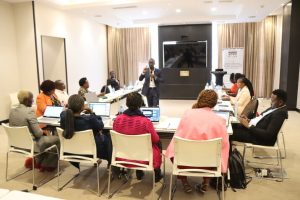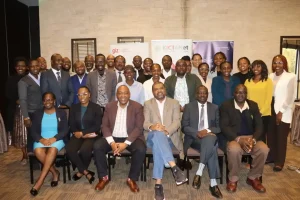Could not agree more with Ali.
Last night on Citizen TV, the outgoing acting CEO, MJ noted Safaricom just
invested more than its competitors.
We should also not discount the fact, that the same corruption which keeps
Kenya down, has something to do with so-called market failure.
It is no secret, that KPTC operatives became very wealthy, while assets
were lost and it (KPTC) ran out of operating funds.
www.nation.co.ke/business/996-391268-obfby5z/index.html
If we could control ourselves from stealing, the State could/should help
Telkom Kenya progress to 5G over the next 10 years.
www.lifewire.com/5g-cell-towers-4584192
As Safaricom grows in Financial services, Telkom should be favoured
(funded) to provide even more affordable data services.
Appointing authorities should include in the Tekom Kenya board people known
(proven) to fight money laundering.
On Fri, Oct 25, 2019 at 8:10 AM Ali Hussein via kictanet <
kictanet@lists.kictanet.or.ke> wrote:
> @Barrack
>
> To quote your mosquito and hammer analogy.
>
> Most people don’t know that from a technological perspective Mpesa was
> actually inferior to the other players in the ecosystem. Airtel Money and
> now T-Kash. What Safaricom did and continue to do is simple:-
>
> They executed and continue to execute better than everyone else. Including
> the banks.
>
> Let me give you some examples.
>
> 1. There will be no Fintech to speak of today in Kenya without Mpesa.
> Fact.
> 2. Mobile Banking is almost 100% based on Mpesa.
> 3. The Banks that have the lion’s share of mobile lending (Not Tala, not
> Branch), but KCB and NCBA have that pivotal position because of their
> partnership with Safaricom.
> 4. Yet still more than 80% of transactions in this country is still in
> cash. Instead of everyone and his grandmother crying foul that Safaricom is
> dominant why not go for the 80% that still operate cash? We have a scarcity
> mentality, is what we have.
>
> Let me go back to the issue of breaking up Mpesa.
>
> I ask, is that really the best option? Us Africans have one serious
> problem. We think too small. In terms of our little countries and villages.
> My humble remedy to this ‘false’ dominance:-
>
> 1. Assist Safaricom to become globally dominant. The remittance market
> worldwide moves $600 billion every year. Peer to peer. The kind of business
> that Mpesa has excelled in. What is Mpesa’s global market share in
> remittances? Less than 1%! What really are we talking about??
>
> 2. Put in place policies to ensure that Safaricom contributes a percentage
> into a Sovereign Fund to fund and activate a FinTech Ecosystem that is
> second to none in the world – Open Banking, APIs ecosystem, seed funding
> etc. instead of cutting off the goose that lays the golden eggs nurture her
> and let her produce more geese that lay golden eggs.
>
> 3. Mpesa is a defacto NeoBank (a bank that is a 100% digital and reaches
> customers using mobile and computer networks only and don’t require
> physical branches). Mpesa is forced to partner with banks because of
> outdated financial policies and regulations that need to be kicked in the
> butt and brought into the 22nd Century, kicking and screaming!
>
> 4. Create an Open Banking/Open Mobile environment where players are
> literally forced to share their networks via APIs so that players can
> compete on an even playing field. Let players charge for their rails if
> they must. Within reasonable parameters. In fact, Safaricom’s *Daraja
> Platform *already does this well.
>
> This, in my humble opinion, will be the best way to ‘tame’ dominance.
> Market Failures and breaking up companies is an excuse for lazy policy
> makers and regulators to correct a ‘mistake’ that customers want. Abuse of
> ‘dominance’ won’t have happened int the first place if policy makers and
> regulators didn’t suffer from a disease I call #StateCapture. A malaise
> that is brought about by not seeing the bigger picture.
>
> We don’t have a problem of dominance. We have a problem of laziness. Let’s
> cure that!
>
> *Ali Hussein*
>
> +254 0713 601113
>
> Twitter: @AliHKassim
>
> Skype: abu-jomo
>
> LinkedIn: ke.linkedin.com/in/alihkassim
>
> “We are what we repeatedly do. Excellence, therefore, is not an act but a
> habit.” ~ Aristotle
>
>
> Sent from my iPad
>
> On 24 Oct 2019, at 11:55 PM, Barrack Otieno via kictanet <
> kictanet@lists.kictanet.or.ke> wrote:
>
>
> I think as the business and the sector matures separation will be key.
> Convergence also makes it hard to measure the digital economy from a
> product or service perspective.
>
> Regards
>
> On Thu, 24 Oct 2019, 11:51 pm Mwendwa Kivuva, <Kivuva@transworldafrica.com>
> wrote:
>
>> Thanks Barrack.
>>
>> To your question, the main aim of this bill as indicated in the document
>> is to “aid in the control of anti-competitive practices by large
>> telecommunication industries in the sector.”
>>
>> Just for context, I saw the acting CEO of Safaricom in the news today
>> challenging the dominance and competition issue.
>>
>> He said that Safaricom’s other main non-telecommunication business,
>> M-pesa, could never have been successful without being bundled with voice
>> and data. He said that the first 5 years of M-pesa was never successful. It
>> was subsidized by voice and data. He also said he does not see the point of
>> separating M-pesa to punish Safaricom for investing heavily to make the
>> business successful.
>>
>> On Thursday, 24 October 2019, Barrack Otieno <otieno.barrack@gmail.com>
>> wrote:
>>
>>> Dear Kivuva,
>>>
>>> I am confused on this one though it makes sense to distill the
>>> components of converged networks. In a way, it will provide better premises
>>> for measuring the digital economy. I am ok with this clause. It needs
>>> further clarity and meat.
>>>
>>> Regards
>>>
>>> Regards
>>>
>>> On Thu, 24 Oct 2019, 9:32 am Mwendwa Kivuva via kictanet, <
>>> kictanet@lists.kictanet.or.ke> wrote:
>>>
>>>> This is a continuation of the debate to amend the Kenya Information and
>>>> Communications Act (KICA).
>>>>
>>>> Comments and thoughts are welcomed for yesterday’s debate moderated by
>>>> Mercy Mutemi on the regulation of social media and blogging. We can
>>>> continue contributing through that thread.
>>>>
>>>> Today, we discuss the amendments to KCIA published on March 15th, 2019,
>>>> recommended by Hon Elisha Odhiambo, MP, seeking to add a new section 25A on
>>>> splitting telecommunications businesses, and section 34A on the
>>>> compensation of telecommunications consumers on call drops, and section 84J
>>>> prescribing how the Universal Service Fund (USF) should be used.
>>>>
>>>> *The new Section 25A requires telecommunications operators to*
>>>> – Obtain a license for additional business.
>>>> – Legally split the telecommunications business from additional
>>>> business.
>>>> – Provide separate accounts and reports in respect of all business
>>>> carried out.
>>>> – Require Communications Authority to report compliance annually to
>>>> Parliament.
>>>>
>>>> The reasons given for this bill are to allow telecommunications
>>>> companies to engage in other businesses, and also aid in the control of
>>>> anti-competitive practices by large industries in the sector.
>>>>
>>>> What are your thoughts on this amendment? Do we have any specific
>>>> recommendations we can pass to Parliament through the public participation
>>>> process?
>>>>
>>>> Warm Regard
>>>> _______________________________________________
>>>> kictanet mailing list
>>>> kictanet@lists.kictanet.or.ke
>>>> lists.kictanet.or.ke/mailman/listinfo/kictanet
>>>> Twitter: http://twitter.com/kictanet
>>>> Facebook: www.facebook.com/KICTANet/
>>>>
>>>> Unsubscribe or change your options at
>>>> lists.kictanet.or.ke/mailman/options/kictanet/otieno.barrack%40gmail.com
>>>>
>>>> The Kenya ICT Action Network (KICTANet) is a multi-stakeholder platform
>>>> for people and institutions interested and involved in ICT policy and
>>>> regulation. The network aims to act as a catalyst for reform in the ICT
>>>> sector in support of the national aim of ICT enabled growth and development.
>>>>
>>>> KICTANetiquette : Adhere to the same standards of acceptable behaviors
>>>> online that you follow in real life: respect people’s times and bandwidth,
>>>> share knowledge, don’t flame or abuse or personalize, respect privacy, do
>>>> not spam, do not market your wares or qualifications.
>>>>
>>> _______________________________________________
> kictanet mailing list
> kictanet@lists.kictanet.or.ke
> lists.kictanet.or.ke/mailman/listinfo/kictanet
> Twitter: http://twitter.com/kictanet
> Facebook: www.facebook.com/KICTANet/
>
> Unsubscribe or change your options at
> lists.kictanet.or.ke/mailman/options/kictanet/info%40campusciti.com
>
> The Kenya ICT Action Network (KICTANet) is a multi-stakeholder platform
> for people and institutions interested and involved in ICT policy and
> regulation. The network aims to act as a catalyst for reform in the ICT
> sector in support of the national aim of ICT enabled growth and development.
>
> KICTANetiquette : Adhere to the same standards of acceptable behaviors
> online that you follow in real life: respect people’s times and bandwidth,
> share knowledge, don’t flame or abuse or personalize, respect privacy, do
> not spam, do not market your wares or qualifications.
>
> _______________________________________________
> kictanet mailing list
> kictanet@lists.kictanet.or.ke
> lists.kictanet.or.ke/mailman/listinfo/kictanet
> Twitter: http://twitter.com/kictanet
> Facebook: www.facebook.com/KICTANet/
>
> Unsubscribe or change your options at
> lists.kictanet.or.ke/mailman/options/kictanet/murigi.muraya%40gmail.com
>
> The Kenya ICT Action Network (KICTANet) is a multi-stakeholder platform
> for people and institutions interested and involved in ICT policy and
> regulation. The network aims to act as a catalyst for reform in the ICT
> sector in support of the national aim of ICT enabled growth and development.
>
> KICTANetiquette : Adhere to the same standards of acceptable behaviors
> online that you follow in real life: respect people’s times and bandwidth,
> share knowledge, don’t flame or abuse or personalize, respect privacy, do
> not spam, do not market your wares or qualifications.
>



